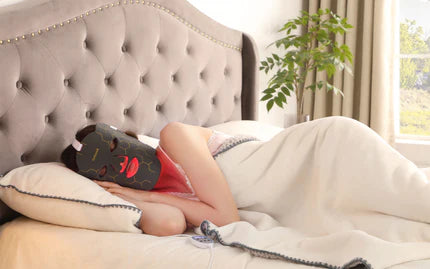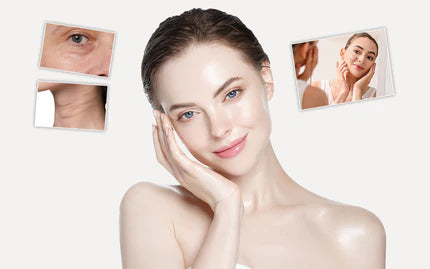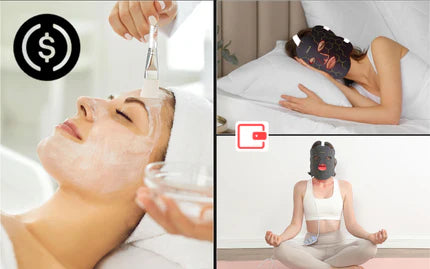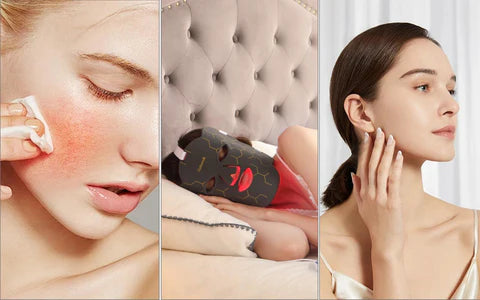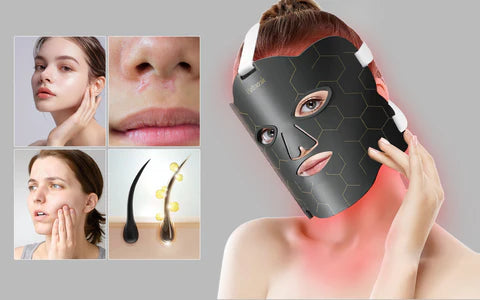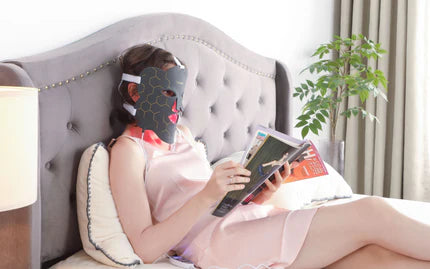Skincare treatments have gained immense popularity among people of all ages. A significant portion of Gen Z shoppers, around 41%, prioritize skincare products in their spending. And it's not just a small trend. People worldwide spent a whopping $135.83 billion on skin care products in 2022. What's more, this market is expected to keep growing by 4.7% every year all the way to 2030.
When it comes to getting rid of wrinkles and keeping skin looking young, Red Light Therapy (RLT) and Botox are often the go-to choices. They're both popular for a reason, but they tackle aging in different ways. In this showdown, we'll explore how each one works, what benefits they offer, their safety, and what they might cost you. Whether you're thinking about a high-tech treatment or a well-known fix, we've got you covered.
Quick Comparison Sheet
| Feature | Red Light Therapy (RLT) | Botox |
| What It Is | Uses red light to boost skin health | Injects protein to freeze muscles |
| How It Works | Enhances cell energy and collagen | Stops muscles from creating wrinkles |
| Benefits | Improves skin over time, reduces inflammation | Quick wrinkle reduction, lasting effects |
| Drawbacks | Needs many sessions, not instant | Can have side effects, needs upkeep |
| Best For |
|
|
| Treatment Area | Full face and body | Targeted facial areas |
| Cost Upfront | Buying a device or per session (more budget-friendly) | Per session (higher immediate cost) |
| Maintenance Cost | Regular sessions needed (affordable long-term) | Repeat treatments every few months |
| Time Commitment | Regular, consistent sessions | Quick visits, less frequent |
| Pain/Discomfort | Minimal to none | Some pain from injections |
What Is Red Light Therapy All About?
Red Light Therapy uses low-level wavelengths of red light to treat various skin issues. This therapy penetrates the skin's layers to stimulate cellular activity. The process enhances the production of collagen, which is essential for maintaining skin elasticity and firmness.

How It Works on the Skin
Red Light Therapy activates the mitochondria in skin cells. Mitochondria produce ATP, the energy currency of cells. Increased ATP production promotes cellular repair and rejuvenation. This process leads to smoother and more vibrant skin. Red Light Therapy also improves blood circulation, which helps deliver nutrients to the skin.
Benefits of Red Light Therapy
Skin rejuvenation
Red Light Therapy offers significant benefits for skin rejuvenation. The therapy reduces wrinkles and fine lines by boosting collagen production. Studies show that Red Light Therapy can improve skin tone and texture. Users often notice a more youthful appearance after consistent sessions.
Anti-inflammatory effects
Red Light Therapy provides anti-inflammatory effects. The therapy reduces redness and swelling in the skin. This makes it beneficial for conditions like acne and rosacea. The non-invasive nature of Red Light Therapy ensures minimal discomfort during treatment.
Drawbacks of Red Light Therapy
Limitations and potential side effects
Red Light Therapy has some limitations. The therapy requires multiple sessions to achieve noticeable results. Some users may experience mild side effects like temporary redness or irritation. These effects usually subside quickly. Red Light Therapy does not provide instant results like some other treatments.
Suitability for different skin types
Red Light Therapy suits most skin types. However, individuals with certain medical conditions should consult a healthcare professional before starting treatment. People with photosensitivity or those taking medications that increase sensitivity to light should exercise caution. Red Light Therapy generally offers a safe and effective option for enhancing skin health.
What Should You Know About Botox?
What is Botox?
Botox involves injecting a purified protein into specific facial muscles. The protein temporarily paralyzes these muscles. This process reduces the appearance of wrinkles and fine lines. Botox targets dynamic wrinkles caused by muscle movement.
How it works on the skin
Botox works by blocking nerve signals to the muscles. This blockage prevents muscle contractions. The skin above the treated muscles appears smoother. Botox provides immediate results, which many users find appealing.
Benefits of Botox
Wrinkle reduction
Botox effectively reduces wrinkles and fine lines. The treatment smooths out crow's feet, forehead lines, and frown lines. Many people choose Botox for its quick results. Studies show that Botox maintains skin elasticity by limiting muscle movement.
Long-lasting effects
Botox offers long-lasting effects with regular treatments. Users often enjoy smoother skin for three to six months. Consistent use can lead to permanent changes in facial expression. Some individuals experience muscle composition changes after long-term use.
Drawbacks of Botox
Potential side effects and risks
Botox carries potential side effects and risks. Some users experience headaches or flu-like symptoms. Eyelid drooping or crooked smiles may occur. These side effects usually resolve within a few weeks. Botox requires repeated procedures for maintenance.
Suitability for different skin types
Botox suits most skin types. People with certain medical conditions should consult a healthcare professional. Individuals with neuromuscular disorders should exercise caution. Botox offers a safe option for reducing wrinkles when administered by a qualified professional.
Comparing Red Light Therapy and Botox
Effectiveness
Short-term vs long-term results
Red Light Therapy and Botox offer different timelines for results. Red Light Therapy requires patience. The therapy promotes collagen production and reduces inflammation over time. Users notice gradual improvements in skin texture and elasticity. Botox provides immediate results. The treatment smooths wrinkles quickly by relaxing facial muscles. Red Light Therapy suits those seeking a natural approach. Botox appeals to individuals desiring fast outcomes.
Areas of the face/body treated
Red Light Therapy and Botox target different areas. Red Light Therapy treats the entire face and body. The therapy addresses issues like acne, redness, and scars. Users benefit from overall skin health improvement. Botox focuses on specific facial muscles. The treatment targets areas prone to dynamic wrinkles. Common areas include the forehead, crow's feet, and frown lines. Red Light Therapy offers versatility. Botox provides precision.
Cost Considerations
Initial costs
Initial costs differ between Red Light Therapy and Botox. Red Light Therapy involves purchasing a device or paying for sessions. The therapy offers a cost-effective option over time. Botox requires payment per session. Each treatment incurs a fee. Red Light Therapy suits budget-conscious individuals. Botox attracts those willing to invest in quick results.
Maintenance costs
Maintenance costs also vary. Red Light Therapy requires ongoing sessions. Users maintain results with regular treatments. The therapy remains affordable in the long run. Botox demands repeated procedures every few months. Users pay for each session to sustain the effects. Red Light Therapy offers a lower-cost alternative. Botox involves continuous financial commitment.

Personal Preferences and Lifestyle
Time commitment
Time commitment plays a role in choosing between Red Light Therapy and Botox. Red Light Therapy requires consistent sessions. Users dedicate time to achieve desired results. The therapy fits into daily routines. Botox provides instant results. The treatment involves short appointments. Red Light Therapy suits those with flexible schedules. Botox appeals to individuals with limited time.
Pain and discomfort levels
Pain and discomfort levels differ between the two treatments. Red Light Therapy offers a gentle experience. Users report minimal discomfort during sessions. The therapy suits individuals sensitive to pain. Botox involves injections. Some users experience mild pain or bruising. Red Light Therapy provides a non-invasive option. Botox attracts those comfortable with needles.
The Bottom Line
If you're patient and looking for a gentle, non-invasive way to gradually improve your skin's health, then Red Light Therapy could be your jam. It might take a bit of time, but it’s kinder to your wallet in the long run. On the flip side, if you're after quick results and don’t mind needles, Botox can give you that noticeable smoothness pretty much right away, though it does ask for a bigger financial commitment over time. So, think about what suits your lifestyle, budget, and how comfy you are with the idea of needles – that should help you make the best choice for your skin.

